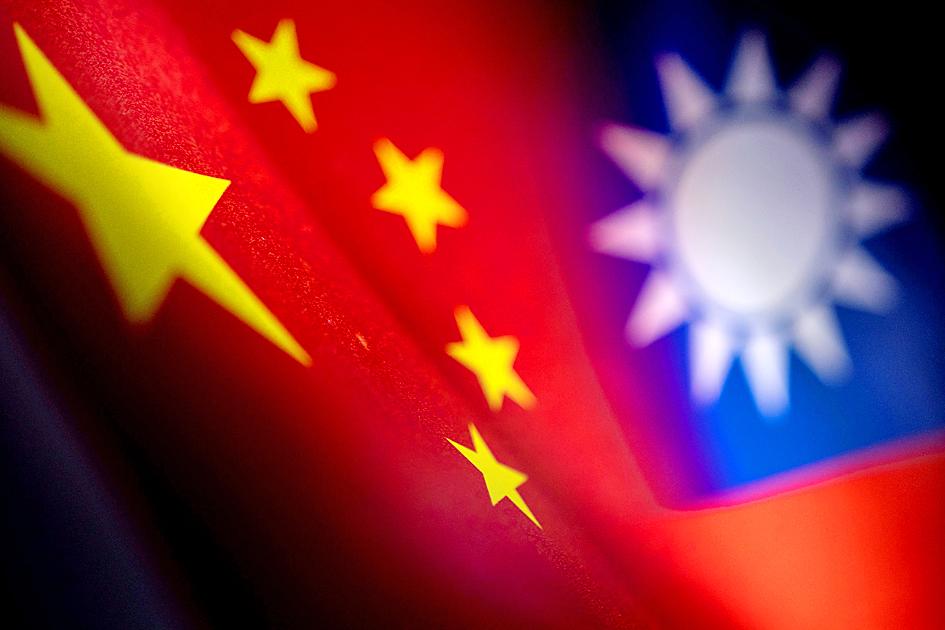Government agencies are considering measures to counter China’s use of Taiwanese Internet celebrities to conduct “cognitive warfare” campaigns in Taiwan, a source said yesterday.
China has trained local Internet celebrities to help it spread propaganda as part of its “united front” efforts against Taiwan, the source said, adding that Beijing was also using TikTok, a Pinterest-like app called Xiaohongshu (also known as Little Red Book) and other social media to influence young Taiwanese.
Citing the Mainland Affairs Council, the source said that officials had warned people cooperating with China that they could face fines or other punishments.

Photo: Reuters
Stipulations under the Act Governing Relations Between the People of the Taiwan Area and the Mainland Area (臺灣地區與大陸地區人民關係條例) and the Anti-Infiltration Act (反滲透法) make it illegal to help China spread propaganda, they said.
Article 33-1 of the Act Governing Relations Between the People of the Taiwan Area and the Mainland Area states that it is illegal to engage in “any form of cooperative activity with the agencies, institutions or organizations of the Mainland Area which are political parties, the military, the administration or of any political nature.”
The Chinese Communist Party typically uses social media to paint a positive image of itself, and to spread ideas about historical connections between Taiwan and China, the source said.
“It is all with the intent of changing young people’s perceptions of China and of the cross-strait relationship,” the source said.
China also hosts events that it invites Taiwanese youth to attend, including an annual “cross-strait youth development forum,” which was held last week in Hangzhou, China, the source said, adding that Taiwanese Internet celebrities have attended remotely over videoconference in the past few years due to the COVID-19 pandemic.
“If the content shared by these Taiwanese on behalf of China contains false information, that could also be punishable under measures that target fake news and disinformation,” the source said, citing statements by Democratic Progressive Party legislators.
Legislators face challenges addressing the issue, as they must also protect free speech in designing legislation, but the Anti-Infiltration Act would likely be amended to better protect against such efforts by China, the source said.
The National Communications Commission is also seeking to tackle the issue through a draft act on digital communications, the source said, adding that the Mainland Affairs Council is also working with the Ministry of Education to educate students about the risks of using TikTok, Xiaohongshu and other Chinese apps.

Alain Robert, known as the "French Spider-Man," praised Alex Honnold as exceptionally well-prepared after the US climber completed a free solo ascent of Taipei 101 yesterday. Robert said Honnold's ascent of the 508m-tall skyscraper in just more than one-and-a-half hours without using safety ropes or equipment was a remarkable achievement. "This is my life," he said in an interview conducted in French, adding that he liked the feeling of being "on the edge of danger." The 63-year-old Frenchman climbed Taipei 101 using ropes in December 2004, taking about four hours to reach the top. On a one-to-10 scale of difficulty, Robert said Taipei 101

Nipah virus infection is to be officially listed as a category 5 notifiable infectious disease in Taiwan in March, while clinical treatment guidelines are being formulated, the Centers for Disease Control (CDC) said yesterday. With Nipah infections being reported in other countries and considering its relatively high fatality rate, the centers on Jan. 16 announced that it would be listed as a notifiable infectious disease to bolster the nation’s systematic early warning system and increase public awareness, the CDC said. Bangladesh reported four fatal cases last year in separate districts, with three linked to raw date palm sap consumption, CDC Epidemic Intelligence

Taiwanese and US defense groups are collaborating to introduce deployable, semi-autonomous manufacturing systems for drones and components in a boost to the nation’s supply chain resilience. Taiwan’s G-Tech Optroelectronics Corp subsidiary GTOC and the US’ Aerkomm Inc on Friday announced an agreement with fellow US-based Firestorm Lab to adopt the latter’s xCell, a technology featuring 3D printers fitted in 6.1m container units. The systems enable aerial platforms and parts to be produced in high volumes from dispersed nodes capable of rapid redeployment, to minimize the risk of enemy strikes and to meet field requirements, they said. Firestorm chief technology officer Ian Muceus said

MORE FALL: An investigation into one of Xi’s key cronies, part of a broader ‘anti-corruption’ drive, indicates that he might have a deep distrust in the military, an expert said China’s latest military purge underscores systemic risks in its shift from collective leadership to sole rule under Chinese President Xi Jinping (習近平), and could disrupt its chain of command and military capabilities, a national security official said yesterday. If decisionmaking within the Chinese Communist Party has become “irrational” under one-man rule, the Taiwan Strait and the regional situation must be approached with extreme caution, given unforeseen risks, they added. The anonymous official made the remarks as China’s Central Military Commission Vice Chairman Zhang Youxia (張又俠) and Joint Staff Department Chief of Staff Liu Zhenli (劉振立) were reportedly being investigated for suspected “serious